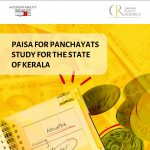
The Paradox of Citizens’ Participation in Urban Governance
9 October 2020
This blog is part of a series that explores the idea of citizen’s participation in urban governance through the Cubbon Park Case Study. Part one and Part two of the series were published in September.
Even as we go to press, the issue of allowing traffic to ply within Cubbon Park, an important lung space in Bengaluru, has been sidelined by another emerging environmental crisis. A peripheral ring road is proposed to be built, which will skirt the city of Bengaluru on its eastern and northern flanks thus diverting traffic away from the city. That is a laudable objective. However, in the process of building the road, not less than 30,000 trees are proposed to be cut down. A forest area is to be sliced, disrupting the fragile ecosystem of whatever remains of the city’s suburban forests. Endangered animals like the Slow Loris, already scarce due to habitat destruction and regressive superstitions, may go extinct.
Public hearings that are mandated for the project to secure environmental clearance have been packed by concerned people, including environmentalists who predict a disaster for the city if the road is not shifted from its proposed alignment. Yet, even as these discussions are aired and argued out in the public, there is a portent of doom, around the entire issue. It seems inevitable, as has happened with several other projects of similar nature in the immediate past that in this case too, public objections will be brushed aside and the road will be built along its present alignment, notwithstanding the serious objections to it.
On another note, a few years back, I was at the training academy for IAS officers at Mussoorie, speaking about the need for a guaranteed land titling system to ensure that property rights are secured. The audience was a bright, if somewhat bored group of senior officers who had spent two decades in the service. As the discussion strayed into the issue of peoples’ participation in urban governance, the general mood in the room was one of scepticism.
‘Why do we need people to participate in urban governance? Nobody is interested,’ said a participant. If specialists are put in charge and bureaucrats are given a free hand without political interference, we would be able to deliver good governance and choose the right options when faced with choices, he concluded.
How best can democracy be modulated, to ensure that all voices are heard, and the right decisions are taken?
I could not help smiling grimly. In a previous class, while speaking of the participation of people in rural governance and explaining the various provisions of the laws of most states, which provide avenues for people to gather and discuss governance by Panchayats, I was told the following. People of rural areas lack ‘capacity’ – whatever that means – and therefore, it was futile to expect them to participate usefully in governance.
I turned the point back to the audience to reflect upon. If, in rural areas, people don’t have the ‘capacity’ to participate, and in urban areas, if people don’t have time to participate, then where will they participate? I asked. Is there, I added, a 10-foot-wide sliver of magical land lying somewhere in the suburbs, where people have both the capacity and the time to participate?
Needless to say, I did not get a cogent answer. Just a snort of disapproval at the assumed speciousness of my logic.
So, this is the real problem.
That behind all the political rhetoric, the welter of laws and rules and regulations, the politician and the bureaucrat do not want people to participate. The bureaucrat is usually more vocal about this because they do not have to stand for elections. Politicians, on the other hand, will never say out loud that they don’t need to respond to people, except for those awkward three months before any election. They will play the game of exciting participation, but decisions are anyway taken and ready, much before the formality of consultation.
How do people overcome this problem? There is no point being naïve about it; to imagine that the problem does not exist at all. A polite politician or bureaucrat, who gives you a reason to exult simply because they heard you out fully and patiently, cannot ensure that your word actually makes a difference.
Will courts make a difference? Yes, and no. In the past, courts have stepped in for the marginalised, taken into account the minority view, and pushed for reforms even though the government was not ready for it. A good example is the role that courts have played in the enforcement of laws that were previously ignored, relating to maintaining air quality and the curbing of pollution. However, these decisions of courts are not consistent in their outrage, speed or the quality of their final directions. It always depends upon the personal preference of the Bench concerned. Must background research is done into discerning whether a judge is ‘green’ enough, before whom a case with environmental implications can be safely raised.
Courts can also cause harm or even damage to the eventual objective, by issuing decisions that are partly in the right direction, but which can upset reforms in another area. The initial judgments of courts on solid waste management are a case in point. These judgments placed the responsibility on ensuring safety and cleanliness on the district and revenue administration, referring to provisions in the criminal law about curbing public nuisances. These judgments did not take into account the fact that under the 74th amendment and the State laws passed in pursuance of it, it was the municipalities that were central to the solution of the problem.
Taking advantage of these judgments of courts, the district administration clawed their way back into municipal administration, thus setting back the objective of strengthening local governments, which was the objective of the 74th amendments. It took at least a decade before the institutional damage to local governments were cured.
Clearly, courts are not the final solution to set right the bad decisions of an errant executive. Then how best can democracy be modulated, to ensure that all voices are heard, and the right decisions are taken? This is a problem that must find an urgent resolution – nearly all problems that humanity will face in future, will be wicked ones, where the solutions will not be acceptable to all sections of society, and often, the best decision will be one that dissatisfies everybody equally.
T.R. Raghunandan is an Advisor at the Accountability Initiative.





